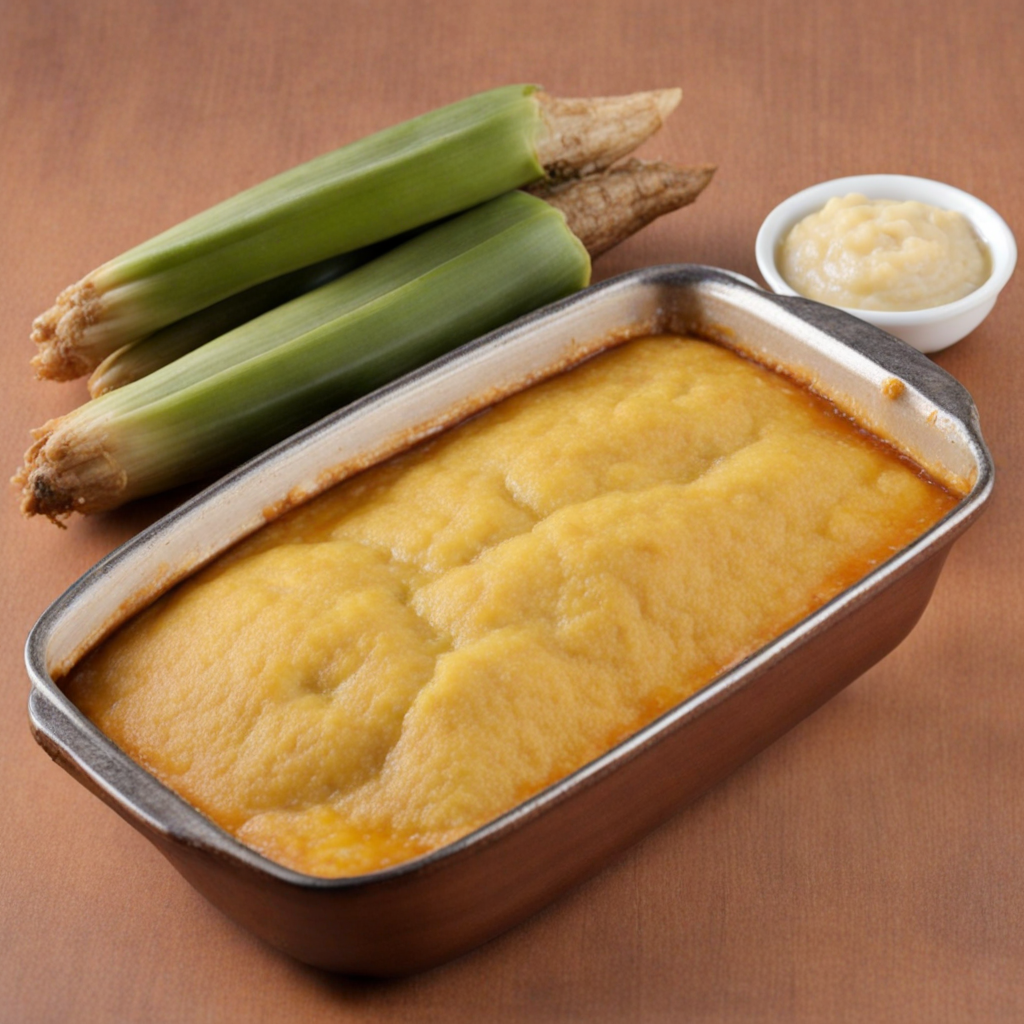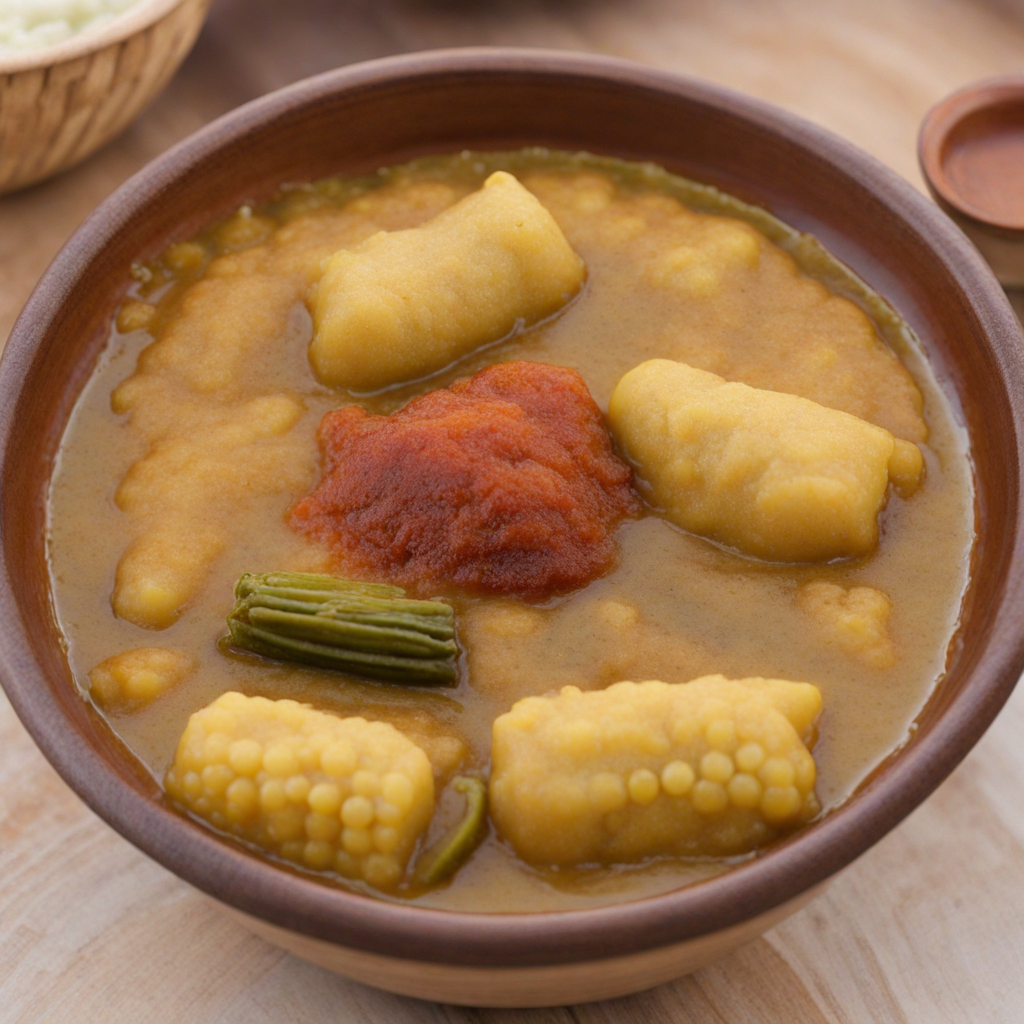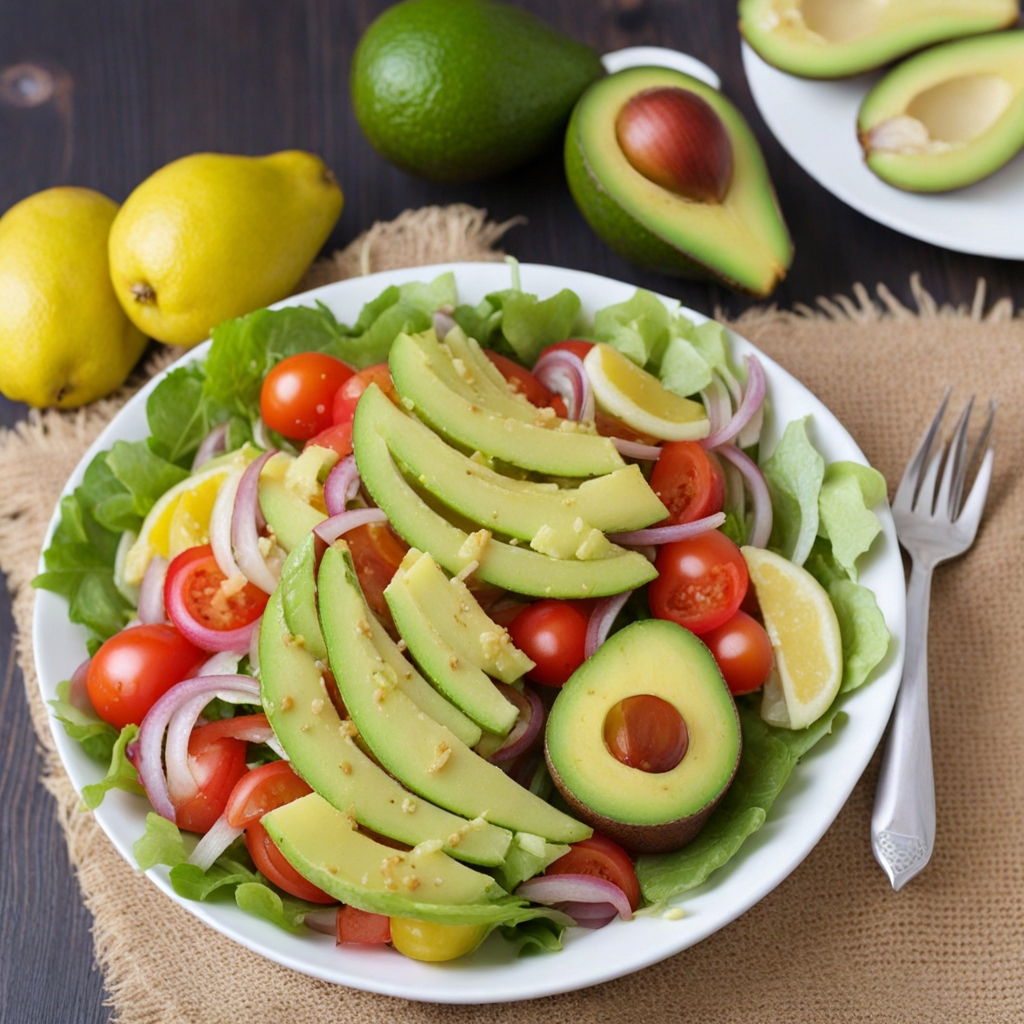Akple
Akple is a traditional Ghanaian dish that holds a special place in the hearts and homes of many Ghanaians, particularly among the Ewe and Fante people. It is a smooth, dough-like staple made from fermented cornmeal and cassava flour, which are combined and cooked in boiling water until they reach a thick, elastic consistency. The process of making Akple involves stirring the mixture vigorously to achieve its signature texture, which is both soft and supple. The result is a delightful, almost pillow-like dish that serves as an excellent accompaniment to a variety of flavorful soups and stews, enhancing the overall dining experience with its subtle taste and satisfying mouthfeel. Typically served in a rounded shape, Akple is often enjoyed with rich, spicy sauces such as groundnut soup, fish stew, or any number of tomato-based sauces that are popular in Ghanaian cuisine. The dish itself has a mildly sweet flavor, which complements the bold spices and robust ingredients found in the accompanying dishes. As you dive into a plate of Akple, you’ll discover how the interplay of textures and flavors creates a satisfying meal that nourishes both the body and soul. One of the most charming aspects of Akple is its communal nature; it's often enjoyed during family gatherings and celebrations, bringing people together over a shared meal. Eating Akple is not just about taste, but also about the experience of tearing off pieces with your hands and dipping them into hearty sauces, making it a truly interactive dining experience. Whether you're savoring it at a bustling local eatery or at a family feast, Akple offers a unique glimpse into Ghanaian culture and culinary tradition, inviting you to explore the rich flavors and warmth of this West African gem.
How It Became This Dish
The History of Akple: A Culinary Treasure from Ghana Akple, a traditional Ghanaian dish, holds a unique place in the culinary landscape of West Africa. It is a staple food made primarily from fermented corn (maize) and is particularly associated with the Ewe people of Ghana, especially in the Volta Region. The history of Akple is rich and multifaceted, encompassing its origins, cultural significance, and its evolution through time. #### Origins The roots of Akple can be traced back to the Ewe people, who have inhabited the southeastern region of Ghana and southern Togo for centuries. The Ewe are known for their agrarian lifestyle, and maize is a crucial crop in their diet. The method of preparing Akple likely evolved as a practical solution to utilize the abundant maize produced in the region. The fermentation process not only enhances the flavor but also increases the nutritional value of the dish, making it a vital source of sustenance. The preparation of Akple typically involves soaking maize in water to allow fermentation. This fermentation process can take several days, and the resulting dough is then cooked to form a smooth, elastic, and somewhat sticky consistency. Akple is often enjoyed with a variety of soups and stews, most notably the spicy fish or meat soups that are characteristic of Ewe cuisine. #### Cultural Significance Akple is more than just a food item; it is a cultural symbol that embodies the social fabric of the Ewe community. Traditionally, Akple is served during important ceremonies and gatherings, such as weddings, funerals, and festivals. It is often accompanied by a rich soup made from ingredients like groundnut (peanut), fish, or meat, which showcases the culinary prowess of the Ewe people. In Ewe culture, the act of preparing and serving Akple is imbued with deep symbolic meaning. The preparation of Akple is often a communal activity, bringing families and communities together. The process of making Akple can involve multiple generations, with elders passing down traditional methods to the younger ones. This transmission of knowledge is crucial for maintaining cultural identity and heritage. Moreover, Akple has a spiritual dimension. It is sometimes offered to ancestors during rituals, reflecting the belief in the interconnectedness of the living and the dead. The offering of food, especially one that is laboriously prepared like Akple, is a way of honoring those who have passed and seeking their blessings for the well-being of the living. #### Development Over Time The journey of Akple through history has mirrored broader societal changes in Ghana. During the colonial period, Ghana (then known as the Gold Coast) underwent significant transformations. With the introduction of Western food practices and the globalization of culinary traditions, traditional foods like Akple faced challenges. Urbanization and migration led to an increased reliance on convenience foods, which threatened the traditional methods of preparation. However, Akple has shown remarkable resilience. In the late 20th century, there was a resurgence of interest in traditional Ghanaian foods as part of a broader movement to reclaim cultural identity. This interest was driven by a desire to preserve culinary heritage in the face of globalization and the influx of fast foods. As Ghanaians began to take pride in their culinary traditions, Akple regained its status as a beloved dish. Today, Akple is enjoyed across Ghana and beyond, often found in restaurants and at social gatherings. Its preparation has also adapted to modern conveniences. While traditional methods are still cherished, many people now use electric blenders for mixing and cooking, speeding up the process while still honoring the essence of the dish. #### Akple in Modern Ghana In contemporary Ghana, Akple is not just a dish for the Ewe people; it has transcended ethnic boundaries and is appreciated by many Ghanaians from diverse backgrounds. It is often featured in national celebrations, such as Independence Day, where traditional foods take center stage. The dish has also found its way into the global culinary scene, with Ghanaian immigrants introducing Akple to new audiences in countries like the United States, Canada, and the United Kingdom. Furthermore, Akple has been embraced by food enthusiasts and chefs who experiment with its flavors and presentation. While the traditional pairing with spicy soup remains popular, modern interpretations may incorporate fusion elements, pairing Akple with diverse sauces and accompaniments to cater to a wider audience. This evolution reflects the dynamic nature of food and its ability to adapt while still honoring its roots. #### Conclusion Akple is more than just a dish; it is a reflection of the history, culture, and resilience of the Ewe people and Ghana as a whole. From its origins as a staple food to its role in communal gatherings and rituals, Akple embodies the spirit of togetherness and cultural pride. In a world where culinary traditions are often at risk of being overshadowed by globalization, Akple stands as a testament to the importance of preserving heritage and celebrating the flavors that define us. As it continues to evolve and adapt, Akple remains a cherished symbol of Ghanaian identity, connecting generations through its rich history and delicious taste.
You may like
Discover local flavors from Ghana







